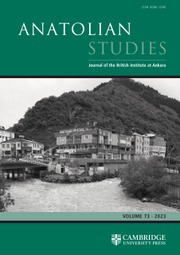Article contents
Bronze Age höyüks, Iron Age hilltop forts, Roman poleis and Byzantine pilgrimage in Germia and its vicinity. ‘Connectivity’ and a lack of ‘definite places’ on the central Anatolian high plateau
Published online by Cambridge University Press: 11 July 2013
Abstract
Germia was a well-connected Byzantine polis in western-central Anatolia, famous for its healing waters and a church of St Michael. After three years of survey the site can now be reconstructed: it included several other churches and monasteries, but little space for ordinary residential buildings. This comes as a surprise, but can be explained by the discovery of two older Roman cities within walking-distance of Germia, where the ordinary people seem to have lived. One of these cities, Mantalos, was home to a local cult of the pagan god Men. This may explain why the Christian healing centre was established at Germia. Later, Mantalos shed its pagan legacy and was apparently renamed Eudoxias after a homonymous member of the Theodosian dynasty. No Roman or Byzantine settlement of the region has a history extending back beyond the Iron Age, when the population retreated to fortified hilltop settlements and many sizable Bronze Age höyüks were deserted. Settlement locations changed often and grew little in central Anatolia, and this may be blamed on the uniform landscape of the high plateau; it lacks the Mediterranean's diverse geography of ‘definite places’ that would favour one site above others and ensure its continuity and growth.
Özet
İç Batı Anadolu’da yer alan Germia, şifalı suları ve St Michael’a ait kilisesi ile ünlü ve iyi bağlantılara sahip bir Bizans şehridir. Üç yıl süren yüzey araştırması sonrasında yerleşim rekonstrükte edilebilmiştir. Birçok kilise ve manastırlara sahiptir; fakat olağan konutsal yapılar için az alan bulunmaktadır. Bu durum şaşırtıcı olsa da, Germia’ya yürüme mesafesinde yer alan ve olasılıkla sıradan insanların yaşamış olduğu, iki daha eski Roma şehrinin varlığıyla açıklanabilir. Bu şehirlerden biri olan Mantalos, pagan tanrısı Men’e ait yerel külte ev sahipliği yapmaktaydı. Bu durum, Hıristiyan şifa merkezinin neden Germia’da yapıldığını açıklayabilir. Sonradan, Mantalos pagan mirasından sıyrılmış ve anlaşılan Theodosius hanedanlığından bir kişiyle aynı ismi alarak Eudoxias olarak yeniden adlandırılmıştır. Bölgedeki hiçbir Roma ve Bizans yerleşiminin Demir Çağı’ndan öncesine uzanan bir geçmişi saptanamamıştır. Bunun nedeni toplumun tepe üzerinde yer alan tahkimli yerleşimlere geri çekilişiyle pek çok büyük Tunç Çağı höyüklerinin terkedilmiş olmasıdır. Orta Anadolu’da yerleşim yerleri sıklıkla değişmiştir ve çok az büyüme göstermiştir. Bu durum yüksek platonun tek düzey yüzey şekli ile açıklanabilir. Bu bölge, Akdeniz’in çeşitlilik gösteren coğrafyasında yer alan, bir yerleşimi diğerlerinden ayrıcalıklı yapan ve devamlılığı sayesinde büyümeyi sağlayan belirli özelliklere sahip ‘sınırlı bölgeler’den yoksundur.
- Type
- Articles
- Information
- Copyright
- Copyright © The British Institute at Ankara 2013
- 10
- Cited by


